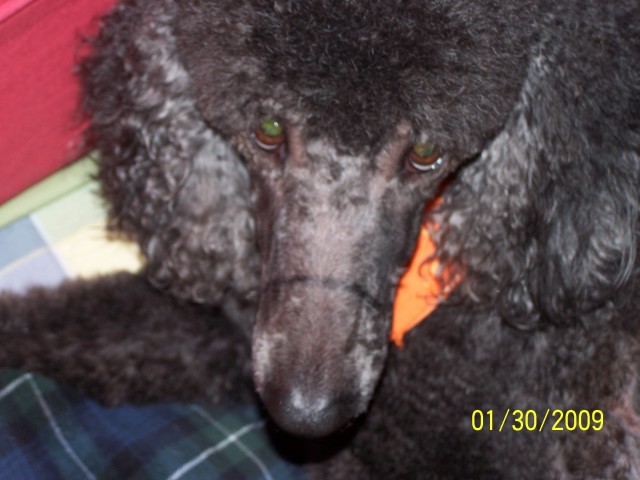QuestionOur vet just diagnosed our standard poodle with an enlarged heart that is pressing against his esophogus. He has indicated that his heart is beating at 4 times the normal rate and said he could die in 10 minutes to a few months. Of course, I am devistated and depressed. I just want him to not hurt and know what to expect from others who have fought the same battle. Any ideas? The vet did give us come pills to give him a couple times a day but since my husband took the dog to the vet, I'm not sure what they are for. I'm just so very sad!
AnswerHello Cyndi,
Sorry to hear about your Poodles condition. I have a dog with Congestive Heart Failure so I know how you feel.
Congestive heart failure is an enlarged heart. No mater what the underlying heart problem is, CHF is usually the end result.
CHF occurs when the heart is unable to meet the circulatory demands of the body. Many things can cause the heart to be faced with increased back pressure and decreased effectiveness as a pump. Valvular defects, tumors, heartworms, heart beat abnormalities, and damaged to the muscle itself all cause the heart to enlarge and blood to pool in the organs and lungs. The net effect of all this is called congestive heart failure.
I have been giving my boy Herbal remedies and supplements since I discovered his CHF and it has made a difference.
Please check out this website that suggests Herbs and supplements that help dogs with Heart problems: http://www.natural-dog-health-remedies.com/dog-heart-problems.html
I would recommend the Hawthorn, Dandelion, Cayenne, CoQ-10, and L-Carnitine(very important for dogs with heart problems). I would print the sheet off and go over them with your Vet. If he doesn't think these will help, I would look to a Holistic Vet in your area.
You might also check into NuVet Plus Pet Tabs for your dog. They contain a variety of Vitamins, Minerals, Herbs, and Supplements to help dogs with a wide range of illnesses including Heart Disease. They contain some of the vitamins and the Magnesium, Selenium and L-Taurine that was suggested in the website above.
I am a distributor of these wonderful tabs and my own Poodle uses them on a daily basis. They have helped his CHF and also have given him more energy and have reduced some of his small tumors he had on his head. Go to http://www.nuvet.com/53330 and navigate the site using the menu items at the top of the bar. You can see products, ingredients, and even testimonials about how this wonderful product has helped others Beloved Pets. When ordering, please call 800-474-7044 to speak to a representative and use the ID Code: 53330 *NuVet Plus Pet Tabs also come in a bottle of 30 for around $25 that isn't mentioned on the site.
If you have any questions please contact me at MsTopkdog@yahoo.com
Kim
This should help also, I found it on a site that contained alot of information, so I copied the part you need here. It lists some of the Supplements I listed, and also medication so you can check the bottle your husband brought home to see if it is one of the ones listed below.
Since CHF is a common human problem, drugs are constantly being developing and refining to treat it. These human medications work quite well in our pets too. So your veterinarian may be using a drug I have not mentioned. This is particularly the case if you visit a veterinary cardiologist. However, it is uncertain if these newer human medications extend the life of your pet any more than those that are more commonly used by your local veterinarian.
Veterinarians treat CHF with several medication groups at once:
Diuretics:
We remove as much pooled fluids and blood as we can with drugs called diuretics. Once these fluids are removed from your pet's lungs, the cough should go away or be much better. The big pot-belly associated with CHF should also go away. The most commonly used diuretics is furosemide (Lasix).
When furosemide will no longer remove enough fluid from your pet, we often add a second diuretic called spironolactone.
Do not be surprised when your pet drinks and urinates more on these medications.
ACE Inhibitors:
We also increase the diameter of blood vessels throughout the body with vasodilator drugs so the heart does not have to work as hard. Most of the medicines of this group are called ACE inhibitors. The most common ones in this group are enalapril (Enacard) and Lisinopril (Prinivil).
By making it easier for blood to flow through blood vessels, ACE inhibitors help decrease your pet's heart rate, and help preserve the heart's remaining strength. The most common side effect of these drugs is lack of appetite and vomiting. If that occurs, the dose needs to be adjusted.
Inodilators:
Inodilators are an exciting group of drugs that seem to definitely extend the lives of dogs with CHF. The one most commonly used is called Pimobendan (Vetmedin). It increases the amount of blood that the weakened heart can pump by giving more strength to its muscle fibers. It also opens up blood vessels throughout the body so the heart doesn't have to work as hard. A study found that dogs receiving pimobendan and furosemide lived 9 months longer than those receiving only enalpril and furosemide. It has been used in cats, although it is not licensed for that species.
Positive Ionotrophs:
Another group of drugs we used when diuretics and ACE inhibitors were not enough are called Positive ionotrophic agents. A drug in this group that was quite popular is digoxin. Because of its potent side effects and the limited length of time pets will survive while on it, I rarely prescribe it. It is a medicine of last resort.
Anti-arrhythmics:
The heart has an electrical wiring system to coordinate it's contractions. When the heart is damaged, this system may fail. We call the abnormal beat rhythm a cardiac arrhythmia.
Some of the drugs used to control arrhythmias are propranolol (Inderal) procainamide (Pronestyl), and tocainide (Tonocard).
Less Proven Medications:
Many veterinarians suggest pets with heart disease consume a low sodium diet. This is a particularly good idea if your pet also has elevated blood pressure or retained fluid. We do not know if low sodium diets are as beneficial to pets as they are to humans.
Some veterinarians prescribe coenzyme Q because of its beneficial effects in people with dilated cardiomyopathy.
Omega-3 Fatty Acids
Omega-3 fatty acids are high in fish oil. In people, there is some evidence that omega-3 supplements might reduce the risk of heart attacks and strokes. Based on this, some veterinarians suggest that dogs with heart problems also receive them.
L-carnitine (carnatine):
L-carnitine is involved in the process by which the heart muscle converts fats into energy. There is some data that L-carnitine supplements help people who have heart disease. Whether or not it helps pets, we do not know.
Taurine:
There is a small group of dogs and cats that develop heart disease due to a deficiency in the amino acid, Taurine. Since it is non-toxic, some veterinarians suggest a taurine supplement for all their cardiac patients.
Other Things You Can Do:
Keep your pet's weight optimal and feed a name brand commercial diet.
In exercising your pet, keep activity to a level short of what it would take to cause your pet to breath heavily, pant or elevate its heart rate. Don't give up short walks until you absolutely must. Dogs and cats benefit physically and mentally from activity.
Please feel free to contact me if you would like more information or want to talk about this, as I mentioned, I have a dog going through the same thing and I understand.
I hope this helps you some and if you have other questions for me, please feel free to ask. You can go through this site again or contact me at my e-mail at MsTopkdog@yahoo.com
Thanks for using AllExperts.com,
Kim

 poodle continuing to vomit
Question
Oliver
Last week my 11 month old miniat
poodle continuing to vomit
Question
Oliver
Last week my 11 month old miniat
 Precious Yorki Poo Coat
Question
PJ
Hello,
I have an 8 month old Yorkie poo. Re
Precious Yorki Poo Coat
Question
PJ
Hello,
I have an 8 month old Yorkie poo. Re
 Stripe on nose
QuestionStripe on Perrys nose
QUESTION: Hello Ki
Stripe on nose
QuestionStripe on Perrys nose
QUESTION: Hello Ki
 hey kim! my pups are grown but i have a ?
Questionrascal
QUESTION: Hey kim, my puppies ha
hey kim! my pups are grown but i have a ?
Questionrascal
QUESTION: Hey kim, my puppies ha
 is my tiny poodle pup eating enough?
Question
oscar
We recently brought home our 8 week male
is my tiny poodle pup eating enough?
Question
oscar
We recently brought home our 8 week male